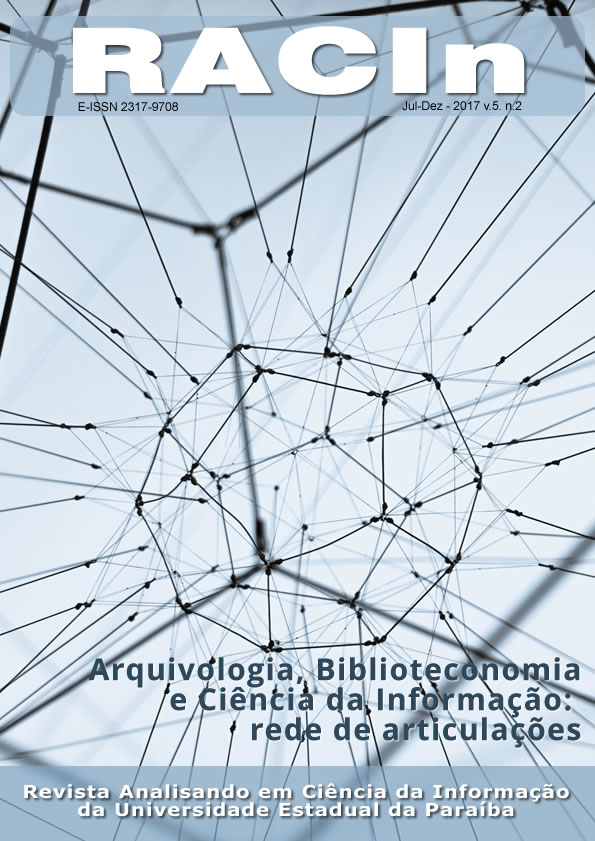THE DOCUMENT ANALYSIS AS A TOOL FOR THE WORK IN GENEALOGY FROM THE FAMILYSEARCH.ORG BASE
Keywords:
Documentary analysis, Indexing, GenealogyAbstract
The article discusses the dual path of importance between language/archive and archive/society, mediated by archival and genealogical information, as well as deliberations about the archivist's conceptual making. The main objectives of the text are,a priori, to deliberate on the discussion stemming from the language applied to the file and, a posteriori, to draw the dichotomy of memory. In order to reach this objective, the authors used a literature review specific to the area, both documentary analysis and indexation of genealogy data, in order to delineate an interdisciplinary panorama between the objects of study and the operation of the aforementioned base, in order to complement the theory and practice of information processing. Nonetheless, it was accessed the program provided by the site and a brief analysis was made of the process of development of the indexing activity, which in turn is carried out by volunteers from various parts of the world, provided with the desire to contribute to the registration of the family history of mankind. As a result of the research, the article presents specific elucidations regarding the archivist's making within a social context steeped in history concerning a particular society and its genealogy. The main inferences found in the course of this study lead one to believe that there is a certain indissociable and essential character between the language - written and nonverbal - and the archive itself, as well as between the archive and society, so that one depends on the other memory-specific functions. These results culminate exactly from the practice of documentary analysis with respect to the descriptive and conceptual treatment of the information contained in the creation and storage of genealogical trees.
References
AMORIN, Mariana de Jesus. O site "Family Search" e a digitalização dos tipos documentais das paróquias da Paraíba. 2016. 38 f. Trabalho de Conclusão de Curso (Graduação em Arquivologia) – Universidade Estadual da Paraíba, Centro de Ciências Biológicas e Sociais aplicadas, João Pessoa, 2016.
BARROS, Diana Luz Pessoa de. Teoria semiótica do texto. 5. ed. São Paulo: Ática, 2001.
BERLO, David K. O processo da comunicação: introdução à teoria e prática. Rio de Janeiro: Fundo de Cultura, 1963. (Biblioteca do homem moderno).
BERWANGER, Ana Regina; LEAL, João Eurípedes Franklin. Noções de paleografia e diplomática. 3. ed. Santa Maria: UFSM, 2008.
BURKE, Peter. Uma história social do conhecimento: de Gutenberg a Diderot. Rio de Janeiro: Zahar, 2003.
CASTRO, Astréa de Moraes e; CASTRO, Andresa de Moraes e; GASPARIAN, Danuza de Moraes e Castro. Arquivos: físicos e digitais. Brasília, DF: Thesaurus, 2007.
COBLEY, Paul; JANSZ, Litza. Semiótica para principiantes. Buenos Aires: Era Naciente SRL, 2001.
CONARQ. Recomendações para digitalização de documentos arquivísticos permanentes. Rio de Janeiro: [s.n.], 2010. Disponível em: <http://www.conarq.arquivonacional.gov.br/images/publicacoes_textos/Diretrizes_Construcao_websites.pdf>. Acesso em: 27 jun. 2017.
BRASIL. Arquivo Nacional. Modelo de requisitos para sistemas informatizados de gestão arquivística de documentos. Rio de Janeiro: Arquivo Nacional, 2011. Disponível em: <http://www.arquivonacional.gov.br/images/publicacoes/e-arq.pdf>. Acesso em: 17 jun. 2017.
FAMILYSEARCH.ORG. Salt Lake: FamilySearch, [200-?]. Disponível em: <https://familysearch.org/>. Acesso em: 15 jun. 2017.
FAYARD, Pierre. O jogo da interação: informação e comunicação em estratégia. Caxias do Sul: EDUCS, 2000.
FERRAREZI JÚNIOR, Celso. Semântica para a educação básica. São Paulo: Parábola, 2008.
FONSECA, Maria Odila Kahl. Arquivologia e ciência da informação. Rio de Janeiro: FGV, 2005.
GOMES, Eduardo de Castro. A escrita na história da humanidade. Dialógica, Manaus, v. 1, p. 3, 2007. Disponível em: <http://dialogica.ufam.edu.br/PDF/no3/Eduardo_Aspectos_da_escrita_na_Historia_da_humanidade.pdf>. Acesso em: 30 jun. 2017.
LANCASTER, F. W. Indexação e resumos: teoria e prática. 2. ed. Brasília, DF: Briquet de Lemos/Livros, 2004.
LARAIA, Roque de Barros. Cultura: um conceito antropológico. Rio de Janeiro: Zahar, 2005.
LE COADIC, Yves-François. A ciência da informação. 2. ed. Brasília, DF: Briquet de Lemos/Livros, 2004.
LOJKINE, Jean. A revolução informacional. 3. ed. São Paulo: Cortez, 2002.
RONDINELLI, Rosely Curi. O documento arquivístico ante a realidade digital: uma revisitação conceitual necessária. Rio de Janeiro: FGV, 2013.
SOUSA, Renato Tarciso Barbosa de. A classificação como função matricial do que-fazer arquivístico. In: SANTOS, Vanderlei Batista dos; INNARELLI, Humberto Celeste; SOUSA, Renato Tarciso Barbosa de (Org.). Arquivística em temas contemporâneos: classificação, preservação digital, gestão do conhecimento. 2. ed. Brasília, DF: SENAC, 2008.
Downloads
Published
How to Cite
Issue
Section
License
Copyright (c) 2024 Revista Analisando em Ciência da Informação

This work is licensed under a Creative Commons Attribution-NonCommercial-NoDerivatives 4.0 International License.
As publicações da RACIn estão licenciados sob a Licença Creative Commons CC BY-NC.





